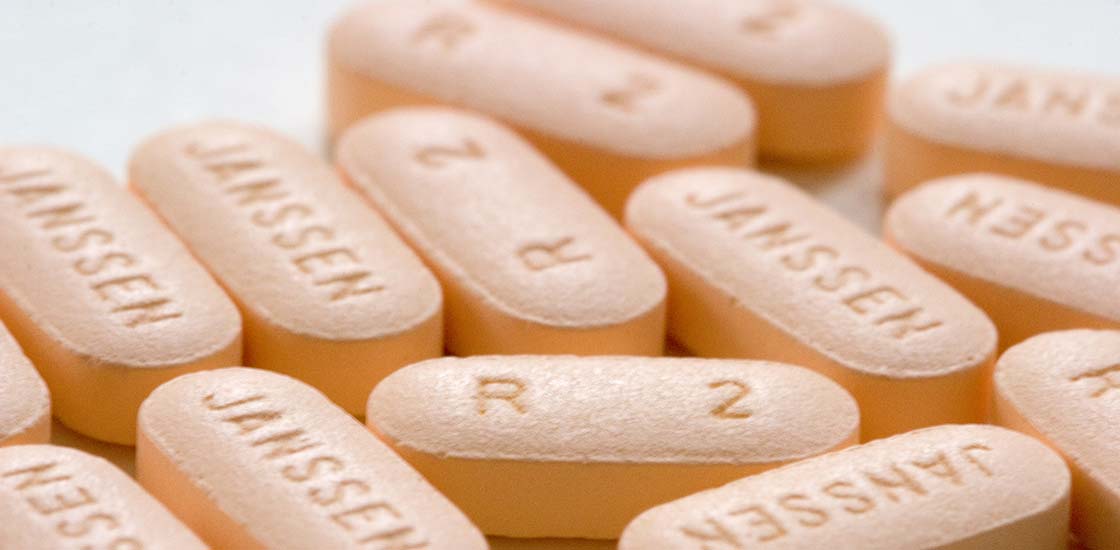
THIS ARTICLE IS MORE THAN FIVE YEARS OLD
This article is more than five years old. Autism research — and science in general — is constantly evolving, so older articles may contain information or theories that have been reevaluated since their original publication date.
Janssen Pharmaceuticals, the leading manufacturer of the widely used autism drug risperidone, omitted data on the drug’s side effects from a 2003 study, according to evidence presented during a lawsuit against the company.
Risperidone, marketed by Janssen as Risperdal, is one of only two drugs approved for autism. It was developed as an antipsychotic for adults with schizophrenia in 1993. Initially, it was not deemed safe for prepubescent children because it can boost levels of prolactin, a hormone that helps new mothers produce milk. Elevated prolactin levels are linked to a range of side effects, including gynecomastia, or growth of breasts, in men and boys.
However, a 2003 study backed by Janssen said it did not find a link between elevated prolactin levels in boys and gynecomastia or other side effects that could result from excess prolactin 1.
In 2006, the Food and Drug Administration (FDA) approved risperidone for easing irritability in children with autism, which may manifest as aggressive outbursts. But the FDA acknowledges that the drug can have dangerous side effects, including severe weight gain. The drug’s label includes a warning that some boys may develop gynecomastia.
In 2013, Janssen settled a lawsuit brought by the FDA for $2.2 billion. The lawsuit alleged that Janssen aggressively marketed Risperdal between 2002 and 2003 for unapproved uses, including in children with autism. A spate of individual lawsuits followed, including one from a now-20-year-old man with autism who grew size 46DD breasts after taking Risperdal between 2002 and 2006. In February, a Philadelphia jury awarded him $2.2 million.
Documents introduced as evidence against Janssen in this case include an early manuscript of the 2003 study that includes two data tables missing from the published version.
Dicey drug:
The study was designed to ferret out potential adverse effects of long-term risperidone use. A team of researchers from Janssen and elsewhere looked at data from 700 children who took risperidone. They reported that prolactin levels rose in these children over the first two months of treatment but returned to normal by five months.
The researchers reported some incidences of what they called SHAP, or ‘side effects hypothetically attributable to prolactin.’ These side effects include gynecomastia, but the study concluded that “there was no direct correlation between elevated prolactin and SHAP.”
The data in the tables introduced in the latest lawsuit directly contradict this finding.
Robyn Frenze, a spokesperson for Janssen Pharmaceuticals, says the company has “acted responsibly regarding informing physicians and patients about the risks and benefits of Risperdal” and plans to vigorously defend itself against claims made in the lawsuit.
Meanwhile, two independent researchers who conducted the study alongside scientists from Janssen have obtained the original data from Janssen. They have spearheaded a reanalysis by an independent biostatistician to see whether the study’s findings are misrepresented in the 2003 article.
“Based on the findings, we will decide whether the paper warrants full retraction, a partial correction or whether the original findings stand,” says one of the researchers, Robert Findling, director of child and adolescent psychiatry at Johns Hopkins University.
The newly surfaced tables show a statistical correlation between elevated prolactin levels and these side effects. According to an article in New Brunswick Today, a Janssen biochemist testified that these tables were never provided to the FDA.
“This is disheartening on many levels,” says Bryan King, professor of psychiatry and behavioral sciences at the University of Washington in Seattle, who was not involved with the study or the lawsuits. “Scientific misconduct is scientific misconduct. I honestly don’t see any difference between withholding something in a deliberate attempt to influence the findings and just making it up.”
Even a full retraction of the study may have no direct impact on risperidone use for autism. The drug’s side effects are widely recognized and included on the drug’s label. Most clinicians prescribe risperidone only when the benefits outweigh the risks, says Edwin Cook, professor of psychiatry at the University of Illinois at Chicago, who was not involved in the study or the lawsuit.
Still, the controversy weighs heavily on a field plagued by distrust of the pharmaceutical industry.
“We absolutely need to be able to work closely with drug companies to move the field forward,” says King. “Something like this tarnishes the industry and that’s very unfortunate, because we absolutely need to be able to work in an environment of trust.”
By joining the discussion, you agree to our privacy policy.